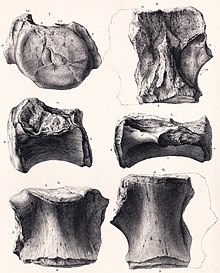
Summary
Bothriospondylus ("excavated vertebra") is a dubious genus of neosauropod sauropod dinosaur. It lived during the Late Jurassic in England, and the type and only species is B. suffossus.[1]
| Bothriospondylus Temporal range: Late Jurassic,
| |
|---|---|

| |
| Illustration of the holotype vertebrae of B. suffosus | |
| Scientific classification | |
| Domain: | Eukaryota |
| Kingdom: | Animalia |
| Phylum: | Chordata |
| Clade: | Dinosauria |
| Clade: | Saurischia |
| Clade: | †Sauropodomorpha |
| Clade: | †Sauropoda |
| Clade: | †Neosauropoda (?) |
| Genus: | †Bothriospondylus Owen, 1875 |
| Species: | †B. suffossus
|
| Binomial name | |
| †Bothriospondylus suffossus Owen, 1875
| |
| Synonyms | |
| |
Discovery and naming edit
The type species, Bothriospondylus suffossus, was described by Richard Owen in 1875.[1] The specific epithet suffossus means "undermined" in Latin, a reference to the fact that pleurocoels had hollowed out the sides of the vertebra. It is often incorrectly spelled as "suffosus". Owen based the species on holotype NHMUK R.44592-5, a set of four dorsal vertebrae found in Wiltshire in stratum from the Kimmeridgian, the Kimmeridge Clay. Also three unfused sacral vertebrae were referred.
At the same time Owen named three other species of Bothriospondylus. B. robustus was based on NHMUK R.22428, a dorsal from the same location. B. elongatus was based on a vertebra from Sussex, NHMUK R.2239, an original syntype of Ornithopsis hulkei. Finally, Bothriospondylus magnus was a new name for another syntype of Ornithopsis hulkei Seeley 1870, the present lectotype NHMUK 28632.[1] Owen himself in an addendum to the same publication renamed B. robustus to Marmarospondylus robustus. Friedrich von Huene in 1908 referred the material to Pelorosaurus and in 1922 made B. suffossus into a Ornithopsis suffossa because the latter generic name has priority.
More complete material from Madagascar was named by Richard Lydekker as a fifth species, Bothriospondylus madagascariensis.[2] Franz Nopcsa in 1902 assigned to Bothriospondylus a vertebra from Argentina that later would be renamed Nopcsaspondylus. A skeleton from France was assigned to Bothriospondylus madagascariensis,[3] but has been described as a new genus and species of brachiosaurid, Vouivria.[4]
In 1986 José Fernando Bonaparte moved material from "B." sp. into its own genus, Lapparentosaurus. The material, sometimes referred to B. madagascariensis, was separated into a few dorsal vertebrae to be the new lectotype of Lapparentosaurus.[5]
A revision in 2010 by Philip Mannion concluded that Bothriospondylus is a nomen dubium. However, "Bothriospondylus" madagascariensis was treated as valid and distinct from other Middle Jurassic sauropods from Madagascar.[6] It was named Narindasaurus thevenini by Royo-Torres et al. in 2020.[7]
Classification edit
Bothriospondylus has over the years been assigned to many groups — even in a Bothriospondylidae of its own[2] — with Brachiosauridae lately being the most popular designation. However, the sparse and eroded material shows no synapomorphies of the Brachiosauridae and cannot be further determined than a very general Neosauropoda.[6]
Current species edit
Only the type species of Bothriospondylus can be referred, because of the dubious nature of the genus.[6]
- Bothriospondylus suffossus Owen, 1875 (type species) = Ornithopsis suffosa (Owen, 1875) von Huene, 1922
Reassigned species edit
Several species have been referred to Bothriospondylus over its existence, with nearly all being reassigned to a new genus.
- Bothriospondylus robustus Owen, 1875 renamed Marmarospondylus (Owen, 1875) Owen, 1875[1]
- Bothriospondylus elongatus Owen, 1875 non Bothriospondylus[6]
- Bothriospondylus magnus Owen, 1875 objective synonym of Ornithopsis hulkei Seeley, 1870[6]
- Bothriospondylus madagascariensis Lydekker, 1895 renamed Vouivria (Mannion, Allain & Moine, 2017)[6]
- "Bothriospondylus madagascariensis" Lydekker, 1895 removed from species and named Lapparentosaurus Bonaparte, 1986[5]
- "Bothriospondylus" Lydekker, 1895 [6]
- "Bothriospondylus" madagascariensis Lydekker, 1895 NHM R2598 NHM R2596–2615, R16588, R16589 Isalo III Formation, Madagascar, Middle Jurassic, Non neosauropod-eusauropod distinct from Lapparentosaurus.[6] Named Narindasaurus Royo-Torres et al., 2020[7]
References edit
- ^ a b c d Owen, R. (1875). "A monograph on the Fossil Reptilia of the Mesozoic Formations. Monograph on the Genus Bothriospondylus". Palaeontographical Society. 29: 15–26. doi:10.1080/02693445.1875.12113267.
- ^ a b Lydekker, R. (1895). "On bones of a sauropodous dinosaur from Madagascar". Quarterly Journal of the Geological Society of London. 51 (1–4): 329–336. doi:10.1144/gsl.jgs.1895.051.01-04.25. S2CID 128431891.
- ^ de Lapparent, A.F. (1943). "Les dinosauriens jurassiques de Damparis (Jura)". Mémoires de la Société Géologique de France. 47: 5–20.
- ^ Mannion, P.D.; Allain, R.; Moine, O. (2017). "The earliest known titanosauriform sauropod dinosaur and the evolution of Brachiosauridae". PeerJ. 5: e3217. doi:10.7717/peerj.3217. PMC 5417094. PMID 28480136.
- ^ a b Bonaparte, J.F. (1986). "Les dinosaures (Carnosaures, Allosauridés, Sauropodes, Cétosauridés) du Jurassique Moyen de Cerro Cóndor (Chubut, Argentina)". Annales de Paléontologie (Vert.-Invert.). 72 (3): 325–386.
- ^ a b c d e f g h Mannion, P.D. (2010). "A revision of the sauropod dinosaur genus 'Bothriospondylus' with a redescription of the type material of the middle Jurassic form 'B. madagascariensis'". Palaeontology. 53 (2): 277–296. doi:10.1111/j.1475-4983.2009.00919.x.
- ^ a b Rafael Royo-Torres; Alberto Cobos; Pedro Mocho; Luis Alcalá (2020). "Origin and evolution of turiasaur dinosaurs set by means of a new 'rosetta' specimen from Spain". Zoological Journal of the Linnean Society. 191: 201–227. doi:10.1093/zoolinnean/zlaa091.
Further reading edit
- Nopcsa, F. 1902. Notizen uber Cretacischen Dinosaurier. Pt. 3. Wirbel eines sudamerikanischen Sauropoden. Akademie der Wissenschaften, 3, 108–114.
- Thevenin, A. 1907. Pale´ontologie de Madagascar. Annales de Pale´ontologie, 2, 121–136.
- Thulborn, R. A. 1973. Teeth of ornithischian dinosaurs from the Upper Jurassic of Portugal. Memo´ria dos Servic¸os Geolo´gicos de Portugal (Nuova Se´ria), 22, 89–134.


